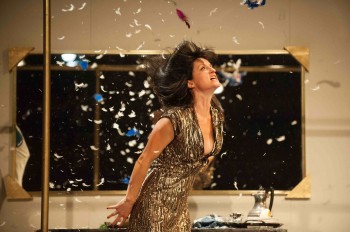The Bitter Tears of Petra Von Kant
A melodrama about female identity, ownership and social hierarchy, The Bitter Tears of Petra Von Kant lays bare the shallow passions and prejudices of an elite social circle. The play is a powder keg, which eventually descends into anarchy as relationships denigrate into chaos, until we finally realise the endless capacity humans have to suffer and come to a deeper understanding of self.

It is within a limited theatrical setting, the confined space of Petra’s apartment, where these explosive scenes come to fruition and the multi-level set (designed by Romaine Harper) allows for the interplay of power and social position to be represented spatially.
Balancing on her unrelentingly high heels, Petra von Kant (masterfully performed by Luisa Hastings Edge), stands as an empress of the erotic, rooting out social hypocrisy, deceit and social pretence. However, in just under two hours, we are privy to her tragic decline. As she ironically becomes the victim of her own unrelenting prejudices and obsessions for Karin (Anna May Samson), Petra flays those around her and in doing so exposes the facets of a femininity as dictated by a patriarchy: her own well-groomed child devoted to looks (and obtaining the attention of boys), a lecherous mother without the means to support herself and a PA without the strength to tear herself away from her abusive employer.
Bitter Tears is permeated by intense social games and characterised by its exceptional cast, each with compelling idiosyncrasies and dressed immaculately (but to their appropriate social rank). The entirely silent – yet always present – Marlene (Joanne Trentini) has a compelling physical score that captures the character’s obsession with Petra. While the anti-heroine’s grasping friend Sidonie’s (Nikki Shiels) obsession with the social elite saturates her every glance.
Director Gary Abrahams has achieved a subtle and honest adaptation, which allows for both melodrama and a depth in these characters to arise. The play deals with extremes of emotion and it is a delicate balance that makes this play so complex – these are shallow characters, but they are not caricatures; in many ways, they are dead souls.
While the play titters on the border between comedy and tragedy, it is not without humour that Petra unceasingly shifts between hatred and love for Karin, but it is also not without great sadness that we must watch her suffer.


